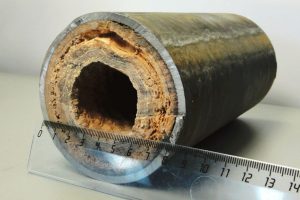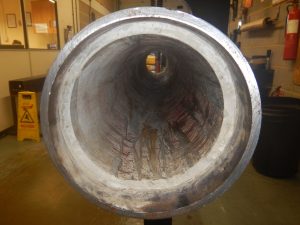DTI: Rotational Scale Scraper – 99 Problems But Scale Ain’t One!
Scale is a big issue. It costs operators in lost production and it costs in time and money to remediate. This is only likely to worsen over time with new developments and drivers such as longer tiebacks, the growing use of (integrity critical) smart wells, increased gas production, the drive for greener chemicals and increasing numbers of water producing wells. In an industry so focused on reducing cost at every turn, scale has got to be one of the biggest challenges in many regions.

So what is scale why is it such an issue in oil & gas wells? Scale is a mineral salt deposit that occurs when the saturation of produced water is affected by changing pressures and temperatures. The scale forms on the inside of tubing/casing and can commonly build up around restrictions, valves and other completion jewelry. In the most extreme cases, the scale itself can form a plug in the well.
What can we do to combat scale in oil & gas wells?
Milling: Mobilise a Coiled Tubing Unit and deploy a Milling BHA. Typical removal rates of Milling are in the range of 5 to 30 linear ft/hr milling.
Jetting: Water or chemical jetting also requires the mobilisation of a Coiled Tubing Unit. Typical removal rates of jetting are up to 100 linear ft/hr dependant on the type of scale and fluids used.
Chemical Dissolution: Pumping acids into the wellbore has varying degrees of success based on the concentrations of chemicals and type of scale build-up.
Inhibition: Typically used after remediation to prevent future scale build-ups. Most inhibitors for inorganic scales are phosphorus compounds.
Mobilising Coiled Tubing Units is a high-cost option so Milling and Jetting are seen as less economical options. Pumping acids is a relatively economical option but comes with its own challenges concerning corrosion and acid resistance of the completion. Inhibition requires scale removal before it can be implemented.
What about an option that doesn’t require the mobilisation of a Coiled Tubing Unit and reduces operational cost to milling operations? DTI’s Rotational Scale Scraper is a slickline deployed rotational scraper that uses a high torque spline jar to rotate the mill blades in opposite directions. Repeated down jarring drives the Mill Blades through the scale with a downwards and rotational action.

The blades are designed to simultaneously engage with scaled tubing so that all the torque is contained within the tool and not transmitted back into the Wireline. A built-in swivel at the upper end of the tool eliminates the chance of twisting the wireline. The tool is available with industry-standard connections and material to suit the operating environment.
- Effectively clean hard scales
- Eliminate milling with Coiled Tubing or Pipe
- Built-in High Torque Spline Jar provides impact and rotation
- Does not twist Wireline
Is this a viable option for every type of scaled-up well? No, there will be applications were mobilising Coiled Tubing Units is unavoidable, but there are many soft, hard and isolated scale scenarios where there could be significant benefits from a low-cost scale removal solution. If you would like to discuss how DTI’s Rotational Scale Scraper can save valuable time and cost, get in touch today.
enquire@dti.uk.com




